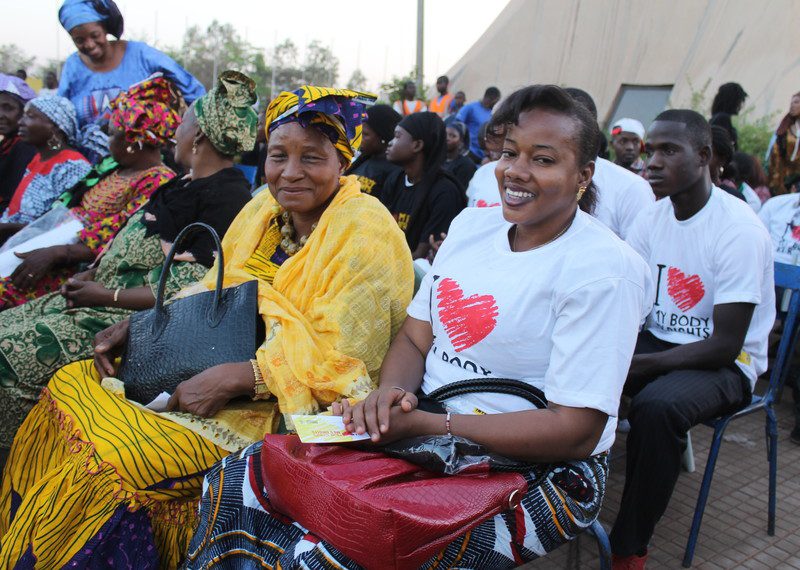We look back at how your campaigning for My Body My Rights has changed women’s lives around the world.
Thousands of you joined us in standing up for sexual and reproductive rights through Amnesty’s My Body My Rights campaign. Launched in 2014, the campaign is founded on the principle that we all – women and men – have the right to make decisions about our health, body, sexuality and reproductive lives without fear or force.
Here are nine ways that you defended those rights and helped break down barriers for women and girls around the world.
1. More than a quarter of a million of you acted to protect young people’s sexual and reproductive rights.
An incredible 280,000 of you from over 165 countries called on your governments to protect young people’s sexual and reproductive rights, including their right to access contraception and sexual health services. In April 2014, Amnesty’s Secretary General Salil Shetty handed your signatures to UN Secretary-General Ban Ki-moon ahead of the UN Commission on Population and Development in New York, USA.
2. Nepal’s government finally recognized uterine prolapse as a human rights issue.
Following sustained lobbying by local women’s rights activists, with support from Amnesty, Nepal’s government included the prevention of uterine prolapse, a debilitating condition that can affect women during pregnancy, as part of their Human Rights action plan in July 2014.
This came shortly after we handed over a petition, signed by more than 100,000 of you, to the government.
3. You helped stop Spain from turning back the clock on abortion.
When Spain moved to restrict abortion laws in December 2013, 133,400 of you stood up in protest over the subsequent months. In September 2014, the government dropped the proposed changes.
4. Your support helped convince governments to challenge El Salvador’s abortion ban.
Intense campaigning, particularly in September 2014 around the launch of our new research on El Salvador, spurred several governments to action. The following month, Australia, Czech Republic, Iceland, Slovenia and Spain spoke at the UN, strongly urging El Salvador’s government to repeal its total abortion ban. The impact of the ban includes prison sentences of more than 40 years for women who suffer still-births.
5. Your signatures compelled ministers in Tunisia to promise to protect survivors of sexual violence.
198,000 of you called on Algeria, Morocco and Tunisia to protect women and girls who have survived sexual violence. When we presented your signatures to the Tunisian government in November 2014, the Secretary of State for Women and Family Affairs and the Minister of Health both pledged to protect survivors of sexual violence – an unprecedented public commitment.
6. El Salvador freed Guadalupe.
Thanks to the hard work of dedicated activists in El Salvador, Carmen Guadalupe Vasquez was finally pardoned and walked free from prison in February 2015. She was jailed for 30 years in 2007 on trumped-up murder charges after suffering a miscarriage when she was 18. She was suspected of having an abortion, which is banned in all cases in El Salvador. In April 2015, we handed over a petition demanding an end to El Salvador’s abortion ban signed by an incredible 300,000 of you.
7. You helped convince the Irish public that women who need abortions are not criminals.
Hundreds of thousands of you spread our message: She is #notacriminal for needing an abortion. Together, we sparked debate within Ireland, shifting public opinion and attracting the support of health professionals and celebrities. With your help, we are getting closer to tipping the balance on abortion in Ireland, bolstering local calls for a change to the constitution that should finally bring an end to Ireland’s regressive abortion law.
8. Your support helped us persuade Burkina Faso’s government to take concrete steps to end child marriage.
In December 2015, Burkina Faso adopted a national strategy and a three-year action plan to prevent and eliminate child marriage in the country. Much more work needs to be done, but this is a first step towards eradicating this practice once and for all. The strategy and plan followed public commitments from ministers and the traditional king to support My Body My Rights by addressing the obstacles that women and girls face when trying to access sexual and reproductive health services and information.
9. Thousands of you broke the silence around sex, relationships and reproduction.
More than 100,000 young people took the lead in starting conversations about traditionally taboo subjects like sexual harassment in schools, rape, child marriage and sexuality. Thanks to educational materials produced by Amnesty and training workshops developed through My Body My Rights, thousands challenged discriminatory attitudes and gender-based violence. Young people did this through workshops, video, theatre, debates, poetry, song and dance. In rural Zimbabwe, they opened empowerment centres in schools as a safe space for young girls to talk about sex, relationships and pregnancy.



